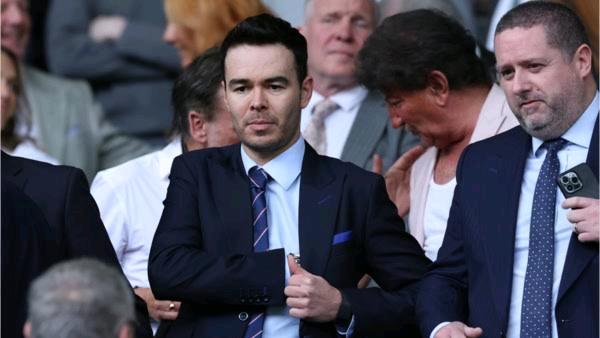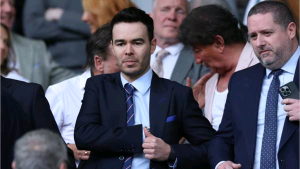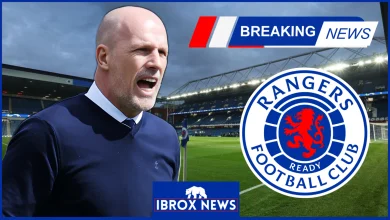” SCANDAL “: The unexpected Rangers withdrawal shakes Ibrox to its core, but the chaos in the boardroom persists for the Gers.

The unexpected Rangers withdrawal shakes Ibrox to its core, but the chaos in the boardroom persists for the Gers.
Rangers are facing additional turmoil as James Bisgrove departs for Saudi Arabia. The widely criticized Stewart Robertson was replaced as the club’s CEO last summer by the former director of marketing and sales.
John Bennett succeeded Douglas Park as chairman, while Nils Koppen eventually took Ross Wilson’s place in the club’s organizational chart. At Ibrox, there was a seismic shift as another Celtic treble followed the days of Park’s cautious expenditure and the public clash with Dave King. Rangers has significantly degraded over the last three seasons, despite lifting 55 and making it to the Europa League Final, and that should not come as a surprise given the current turmoil.
Bisgrove upends the Rangers’ hierarchy of command The last time Rangers won the championship was following three arduous years of hardship under Steven Gerrard. It arrived following a grueling six-year struggle under the club’s hierarchical leadership.
After regaining control of the Ibrox boardroom in 2015, Dave King and the Three Bears cycled through a number of managers before choosing the Scouser. Rangers are currently on their third appointment in the role after Gerrard resigned in November 2021. At Ibrox, it’s Groundhog Day, as we glumly watch Celtic march to title after triumph, with Gerrard, thus far, being the exception rather than the rule. Simultaneously, there has been turmoil on the park and in the recruitment department, which isn’t exactly a good reflection on the club’s circumstances either.
As a matter of fact, the only consistent period of time is the Gerrard era. In the Old Firm match, The Scouser was able to reclaim the upper hand, and our record after his exit is not good. Clement has mocked Ross Wilson’s much debated player contract arrangement and attacked the team’s medical condition. Almost 750 appearances and five players have simply disappeared out of the door.
It is essentially a critique of the absence of long-term planning. The Rangers have truly suffered from years of band-aid solutions and a dearth of backup plans, as they have repeatedly had the rug yanked out from under them. Although James Bisgrove’s circumstances are clearly not ideal, they serve as a metaphor for a team that is having difficulty maintaining the consistency needed to put preventative measures in place both on and off the field. We’ve been overly dependent on specific players, not aggressive enough when it comes to player trades, and too unruly in the dugout and at the top of the club.
There has been a lot of discussion on the club’s direction. There hasn’t been much action yet. Every area is severely weak in leadership, and nothing will change until it does. Rangers need to focus on long-term achievement. Rangers supporters need to understand that change won’t happen quickly after three years of nonstop turmoil in every area of the team. When it comes to defending Rangers’ domestic history against Old Firm rivals Celtic, Philippe Clement needs support from both the stands and the transfer market.
Rangers need stability and consistency at every level of the team in order to mount a meaningful challenge to their domination. This does not imply that players must remain in the dressing room or that bodies must remain in their designated roles. Even in Bisgrove’s case, Karim Virani was able to take on a nearly equivalent role at Ibrox thanks to the former FIFA player’s extraordinary commercial success. It comes down to structure and vision. It is not feasible for us to fire managers every year, and it will take time to successfully execute the necessary adjustments at every level.
The next CEO must be chosen in a way that advances our long-term goals while also providing fail-safes in the event that he or she leaves. Rangers must operate like a well-oiled machine, making regular improvements, replacing components, being proactive rather than reactive to the demands of the contemporary football landscape. Though as the club’s wheels finally begin to turn, one cog abruptly breaks out, I think the current caretakers definitely share that vision. After years of uncertainty and a lack of leadership at every level, Rangers must now agree on the direction the club is going, demonstrate their work to the fans, and ask for patience as we rebuild.
We just cannot achieve the required consistency without it—something that has been glaringly absent ever since we lifted the Premiership trophy. It’s said that reaching the top is simple; the hard part is remaining there. Rangers are terribly unprepared to maintain their position as the undisputed monarchs of the Scottish game, and we are a live, breathing case. Whenever we reach the pinnacle of Scottish football again, which seems unlikely given the current situation, we must make sure we have the infrastructure in place to stay there. It’s been clearly evident in the years since 55 that things were never truly in place.




